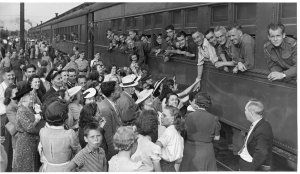Hopes, Concerns, and an Interview partner
Posted: March 24, 2015 Filed under: Uncategorized | Tags: Gender, Gender Roles, hopes and concerns, Second World War, World War II Leave a comment
Mrs. Hamilton was eleven years old when the Second World War broke out. Through an interview with her I am hoping to find out more not only more about her lived experiences, but more about the experiences of women and girls during the Second World War.
But this is not only the information I hope to learn from the interview. I hope to learn a new level of listening in order to better conduct the interview. I also hope to learn how to appropriately time questions so I don’t rush the interview.
I found it relatively easily to find a person to interview, so my main concerns come from the interview process itself. I’m very nervous because for reasons ranging from the fact that Mrs. Hamilton speaks very quietly and I want to make sure that the recorder will pick up her voice properly to more major concerns where I don’t want this to feel like an interrogation. In other words I’m concerned with finding a balance and landing in an interview space, rather than a visit or an interrogation.
What was it like when…? Preserving lived experiences
Posted: January 30, 2015 Filed under: Uncategorized | Tags: Gender, Gender Roles, History, interview, interview topic, Second World War, Women's History, World War II, WWII Leave a commentThe summer before I graduated with my undergraduate degree. I distinctly remember walking around a dig site during our field school excavation and thinking. “I wish we could just ask them what this structure was for—it’d be so interesting to know for certain.” It was the ‘for certain’ that got me. Later in a medieval history class I had the same questions: “If only I could ask them what it was really like to live in the fourteenth century.” Obviously, without a time machine such questions are now impossible to ask.
I’ve found myself (and heard others) asking similar questions about periods in time much closer to the present. My younger brother once asked me “I wonder what it was like to be a fighter pilot during the Second World War” in response to my question about a project he was working on. These are exactly the type of questions that oral history can help us answer. It can help us to preserve others’ lived experiences and extend their voices into the future. It can provide a window to help us understand what life was really like for people as historic events were taking place and how those events impacted their lives personally.
It is in this vein of preservation as well as my own interest in gender roles that I have selected the topic for my interview: women’s roles and how they shifted during and after the Second World War. I would like to interview a woman who lived through the war. I intend to pursue the interview as her life story while paying particular attention to how the war impacted her ideas about gender roles as well as shifts in those roles over time.
Recent Comments